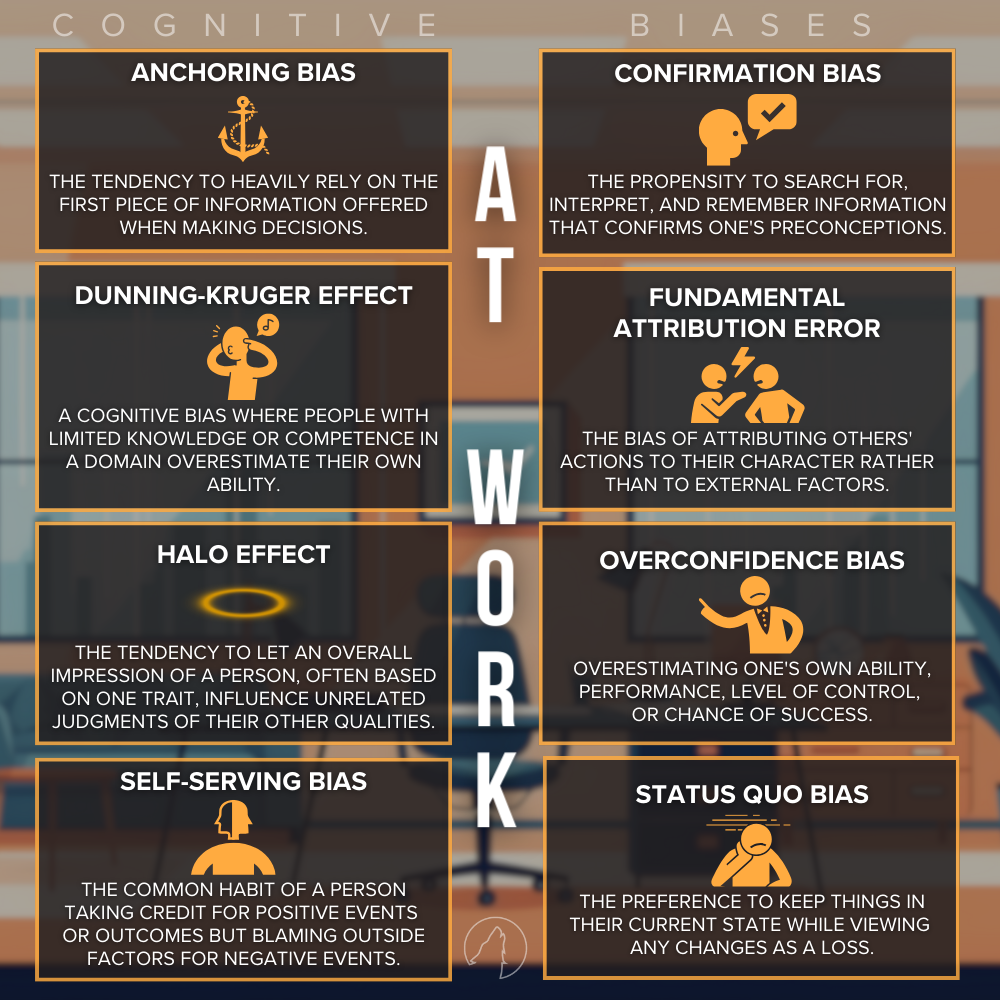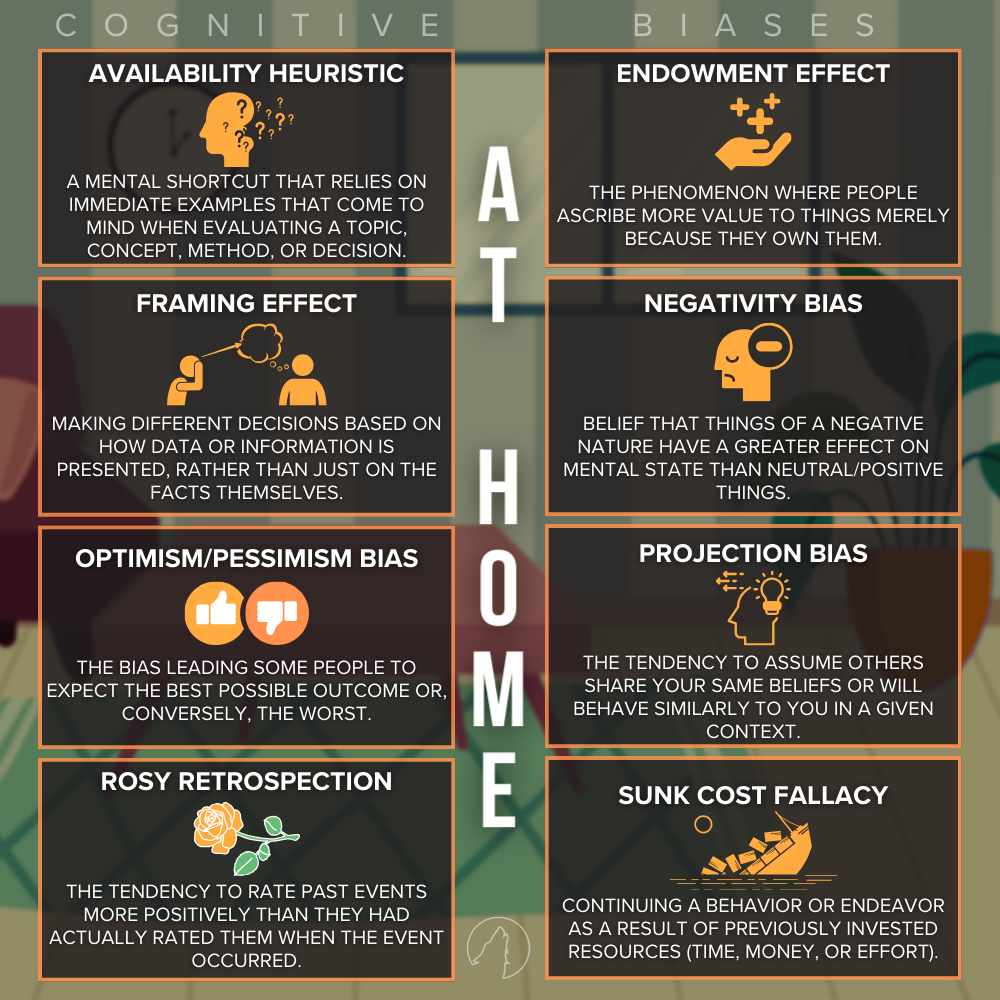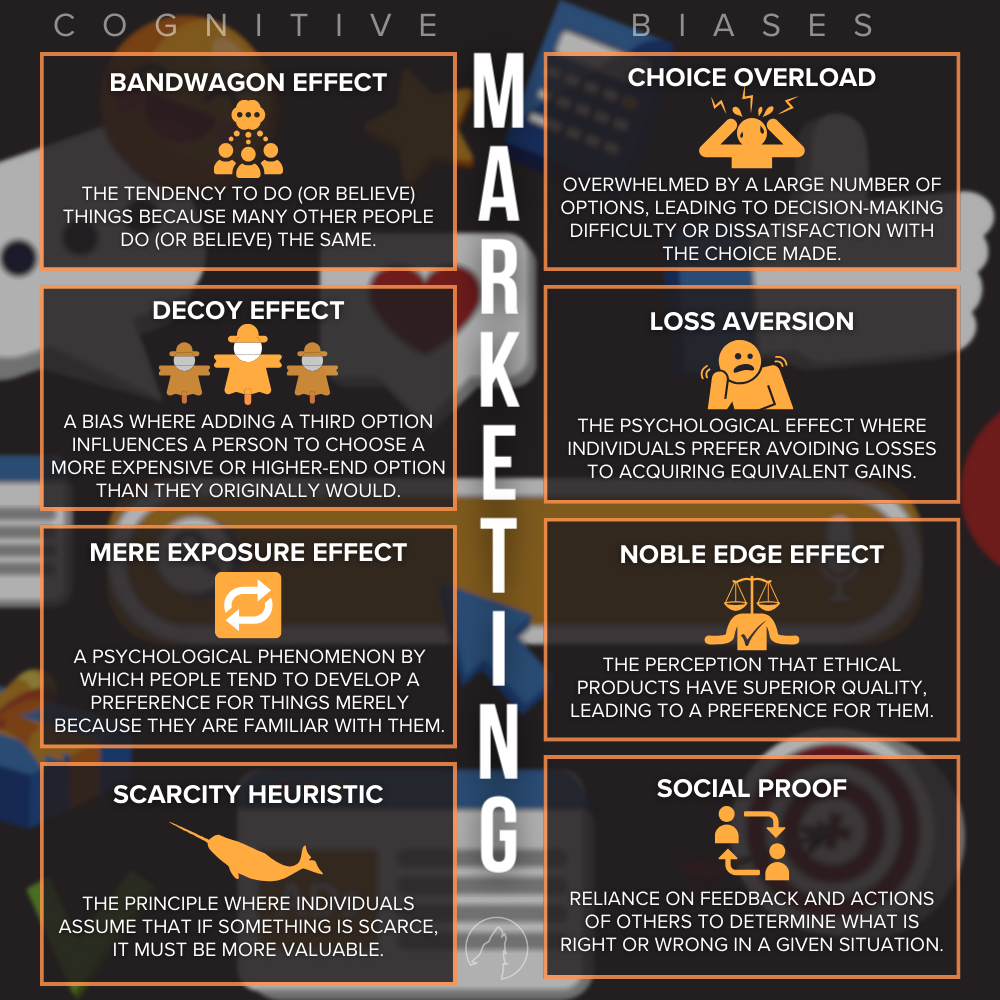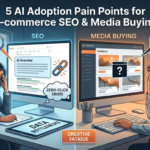To be honest, the title is a little misleading. There are actually way more types of cognitive bias. In total, there are at least 188, and that’s just talking about the ones that are the most relevant biases in behavioral economics.
Don’t faint yet! We’re only going to touch on the top 8 in three categories. When it comes to marketing, they certainly play a part in consumer behaviors. But, they also affect your daily wellbeing and livelihood.
Read on to learn how to gain clearer, more rational decision making that will give you an edge in your career, guide your marketing choices, and best of all, improve your life!

Locus of Control – Stand in the Place Where You Are
So, there’s this thing called the locus of control. Locus of control is a psychological concept that refers to how strongly individuals believe they have control over the situations and experiences that affect their lives.
In this context, “locus” is Latin for “place” or “location.” The theory divides this sense of control into two types:
Internal Locus of Control
Folks with an internal locus of control believe that they are responsible for their own success. They feel that their own actions and decisions directly influence the outcomes in their lives. Such individuals are more likely to take responsibility for their actions and are often more motivated to achieve their goals because they believe they can impact the results through their efforts.
External Locus of Control
People with an external locus of control believe that external factors, such as fate, luck, or other people, control their lives and outcomes. They feel that their own actions are less influential in determining the course of their lives. As a result, these individuals might feel less empowered to change their circumstances and may be more prone to blaming external factors for their misfortunes.
Understanding one’s locus of control can be important in many aspects of life, including mental health, career, education, and relationships. People with a strong internal locus of control, for example, may be better at coping with stress and more successful in academic and professional settings because they believe they can influence outcomes through their actions.
So, what gets in the way of obtaining the clarity that an internal locus of control can provide? That’s right, you smart cookie – a lot of it has to do with your cognitive biases!
And the best news is that the simple act of becoming aware of such mindsets can deflate their looming doomness (it’s a word, don’t look it up). Putting a name to the invisible force driving your actions greatly smurfs their power over you, giving you the space to step back when you see them in action to realize that the only thing making them look so huge and scary is literally the perspective and angle you look at them.
Cognitive Bias in Work, Life, and Marketing
Ready to get your hands dirty and your minds cleared? Great! Because we’re about to dive face-first into how these biases can specifically impact our lives in three outlined areas: career, personal life, and marketing strategies.
On the Job
Because we don’t stop being human just because we’re at work.
Anchoring Bias can set the stage for your entire career trajectory. Imagine walking into a salary negotiation without understanding this bias; you might unknowingly anchor yourself to a lower number, affecting your financial growth for years!
Confirmation Bias can be a real career staller. Ever find yourself dismissing a colleague’s idea because it doesn’t align with your own? That’s this pesky bias at work, potentially closing doors to innovative solutions.
The Dunning-Kruger Effect is like wearing blinders. Overestimating your abilities might lead to taking on tasks beyond your expertise, while underestimating them could mean missing out on opportunities.
Fundamental Attribution Error can lead to workplace misunderstandings. Blaming a colleague’s character for a missed deadline, without considering external factors, can strain team dynamics.
The Halo Effect can distort your view of a ‘star’ team member, potentially overlooking their mistakes, or conversely, underestimating someone who hasn’t had a chance to shine.
Overconfidence Effect in decision-making can lead to risky business moves or project failures. It’s like jumping without checking if there’s a safety net.
Self-serving Bias might make you the hero of your own work narrative, potentially leading to a lack of accountability and growth.
Status Quo Bias can turn your career into a ‘comfort zone’ trap, where fear of change stifles innovation and personal development.
Notice anything familiar from up here that rings an on-the-clock bell?
At Home (In Your Mind)
Because making your mind and home a sanctuary adds years (and joy) to life.
Availability Bias/Heuristic can make a bad week seem like a life crisis. It’s like judging the whole movie based on a single scene.
Endowment Effect is why you might still have that old, unused guitar in your attic. It’s just harder to let go of things once they’re yours.
Framing Effect influences how you react to information, whether it’s news, advice, or a job offer. How things are presented can totally change your decisions.
Negativity Bias can paint your world gloomy. Ever noticed how one bad moment can overshadow a whole day of good ones?
Optimism/Pessimism Bias can act as your life’s ‘filter’ – whether you see a challenge as a stepping stone or a stumbling block.
Projection Bias is like assuming everyone loves pineapple on pizza just because you do (as you should 🥸). It can lead to misunderstandings in relationships and social interactions.
Rosy Retrospection might have you yearning for the ‘good old days,’ potentially making the present seem less satisfying.
Sunk Cost Fallacy can keep you in bad relationships, unfulfilling jobs, or even binge-watching a dull TV series, just because you’ve already invested time in it.
I wonder how your days might change if you start keeping tabs on the types of intrusive thoughts that arise.
Marketing Strategies
Because we still have to do that thing we do, and why not do it well?
Bandwagon Effect is why testimonials and user numbers are marketing gold. “10,000 users can’t be wrong,” right?
Choice Overload can make or break a sale. Too many options can overwhelm a customer, leading them to walk away instead of choosing.
Decoy Effect is a nifty pricing strategy. Ever wondered why that middle-priced product suddenly seems more attractive?
Loss Aversion taps into the fear of missing out. It’s why limited-time offers or the last item in stock can feel so compelling.
Mere Exposure Effect is the reason seeing a brand or product repeatedly can warm you up to it, even if you didn’t like it initially.
Noble Edge Effect leverages the growing consumer desire for ethical and socially responsible brands. It’s not just what you sell, but what you stand for.
Scarcity Heuristic creates a sense of urgency. “Only a few left in stock!” can be the push a customer needs to make that purchase.
Social Proof is powerful; showcasing customer reviews and ratings can significantly influence purchasing decisions.
Mastering the balance between ethical and manipulative tactics listed here can change more than just a campaign or two.
Recognizing these biases in action can be a game-changer in how you navigate your career, personal life, and marketing strategies. It’s like having a secret map to navigate the maze of human psychology.
Once you understand these biases, you can make more rational decisions, improve your interactions, and even influence consumer behavior more effectively.
Why Are We So Prone To Duping Ourselves?
No one ever lies to us more than we lie to ourselves.
Take less than 5 minutes (or even less if you’re like me and put speed at 1.25 or 1.5x) to have this question answered:
Don’t Stop Now
What a wealth of information, and we’ve barely scratched the surface! If you want to read more about these biases+, check out the “More Brain Food” section below. Additionally, I highly suggest listening to these podcasts:
- For Work – Woo-Kyoung Ahn — Armchair Expert (Yale psychologist on thinking).
- For Life – Amishi Jha — Armchair Expert (University of Miami neuroscientist).
- For Marketing – Understanding Cognitive Bias | Learning for Justice (Dr. Steven Sloman, professor of cognitive linguistic and psychological sciences at Brown University, and Dr. Lisa Fazio, Vanderbilt University’s Peabody College assistant professor of psychology for learning and memory).
Knowledge is power, and in this case, it’s the power to see through the fog of cognitive bias and make clearer, smarter choices in every facet of your life.
You got this, because WE’VE got this. Happy de-biasing!
More Brain Food
- YourBias.is – Free visuals “to help make the world a more rational and thinky place”!
- Every Single Cognitive Bias in One Infographic – (188 of them 😅)
- Harvard Implicit Association Test – Test your own cognitive bias in a variety of areas to learn more about how your own brain works!








